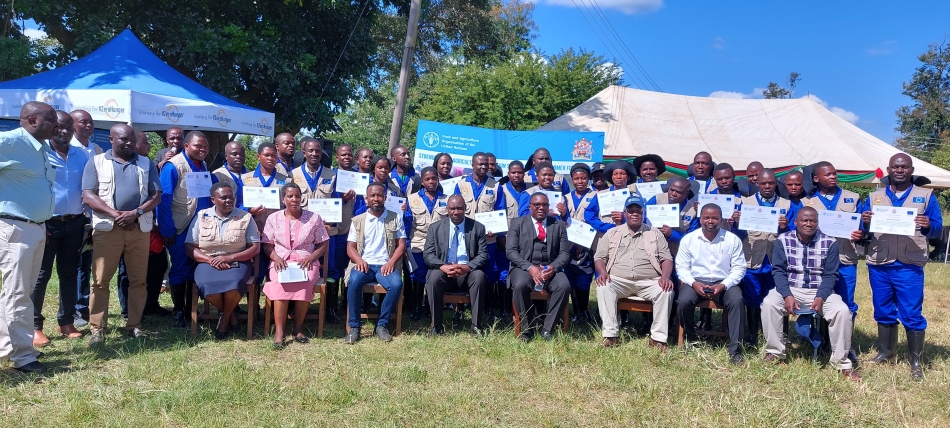16/06/2023 Agricultural production and productivity in Malawi are constrained by many factors, including lack of access to information on modern ways of production. The majority of Malawian farmers have, for so many years, suffered from decreased numbers of technical extension workers, which, to some extent has contributed to sub-optimal performance of the agriculture sector. Extension services play varying roles in improving production and productivity at household level. Productivity is too low resulting from low levels of adoption of modern technologies, limited access to improved farm inputs, low levels of mechanization as well as weak linkages to output markets. A International Food Policy Research Institute paper from 2015 explains how extension services and frequency of extension visits to farmers significantly influence the adoption of recommended agronomic practices while on the other hand, contact with extension services is not significant in explaining smallholder farmer adoption of inorganic fertilizers and hybrid maize seed. These inconsistent study results mirror the challenges and weaknesses in extension service delivery in the country and signal the inconsistent quality and relevance of the extension messages provided to farmers.
In order to respond to the challenges and to revamp and improve extension service delivery, FAO in collaboration with the Government of Malawi and with funding from the European Union designed the KULIMA programme. This project supports the existing national agricultural extension delivery strategy of nurturing model villages through the Farmer Field Schools (FFS) approach. The FFS provides agricultural advisory services, helping smallholder farmers in particular, acquire new skills and knowledge and to become more resilient to climate change and other challenges in their communities or ecosystems. The approach has increasingly been recognized as a way to develop skills of highly diverse smallholder farmers and rural communities and increase their food, nutrition and income security in a rapidly changing context. The approach further supports capacities of the extension service providers to facilitate transformative learning for achieving sustainable production and productivity by empowering productive farmers to identify and cope with emerging challenges.
Since its inception in 2017, the KULIMA programme has worked with 8 177 lead farmers and 492 extension workers have been trained as community based facilitators (CBFs) and master trainers (MTs) respectively. The trainings are being held at government owned residential training centres (RTCs) in Mzuzu, Mponela, Lisasadzi, Namiasi and Thuchira. These facilities were once run down and dilapidated due to a lack of investment and maintenance, but thanks to the FFS programme, they have been renovated to hold training sessions. Further, the approach has helped to alleviate and bridge the communication and information gap that was created by the liberalization of the extension services in Malawi at the beginning of the new millennium. In 2000, the Ministry of Agriculture developed a new extension policy, whose focus is on the role of farmers seeking the extension services they need instead of the government employed extension worker going to farmers with a pre-determined message (demand driven extension services); this helped to create technical information gap within the agricultural extension advisory services.
Interaction with beneficiary farmers reveals that the FFS approach has helped to increase production and productivity per unit area. In Thyolo district, land holding size is too small due to population pressure. Farmers who were harvesting, for example, 400 kg of maize on a 0.2 ha piece of land are now harvesting 1.750 kg, over 70 percent increase in production. This is a direct result of adopting good agricultural practices acquired from the intensive practical field training which simplifies adoption and application of new knowledge and skills. There has also been farm level enterprise diversification. The increase in production and subsequently in household incomes, have encouraged farmers to invest not only in only in one enterprise (cereal crop production) but also into two or more community businesses to help expand their income generation capacities and spread risks associated with narrow production bases. The programme has documented investment in apiculture, piggery, dairy cow farming, goat production, poultry as well as high value horticultural enterprises. With expansion and stability in income generating capacities, the majority of the beneficiary communities have been able to improve the way they live (by building better and durable houses), buying high value assets, sending children to school and eating diversified foods. This is supported by the baseline data from the programme’s monitoring and evaluation system. Furthermore, data from FAO and NGO consortium on FFS shows that over 58 percent of their members are women, this is important to highlight considering the role of women farmers in food production at household level.
More significantly, FFS has greatly helped in enhancing the ability of adults to learn and acquire new farming knowledge and skills. This encourages them to innovate and adopt better ways of production and living. Farmers say they are now better at food budgeting and making better nutrition decisions thanks to time spent at FFS.
FAO has been at the core of developing, implementing, and revising the FFS approach worldwide for over 30 years now. Its ability to reach out to experts from outside the country helped to set the foundation for developing the capacity of Malawi’s Ministry of Agriculture and its field technical officers. Malawi has benefitted enormously from the experiences of FFS experts from the Horn of Africa region where the implementation of this approach is at an advanced stage. Furthermore, the positive relationship between FAO, government officials and other research institutions in the country facilitated timely institutionalization of the approach. And now the national agriculture policy recognizes FFS as one of the key approaches for supporting extension service delivery in the country.
